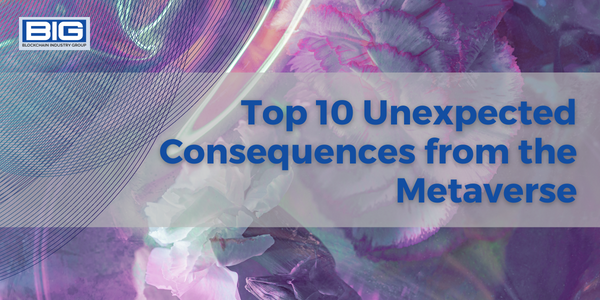
As the metaverse, a shared virtual space created by the convergence of the physical and digital worlds, continues to grow and evolve, we can expect to see a wide range of novel and unusual consequences resulting from our future immersion in this virtual world. Here are the top 10 novel and unusual consequences of future immersion in the metaverse:
- Virtual reality social dynamics: The metaverse could change the way we interact and form relationships with others. For example, individuals may be more likely to form friendships with others based on shared interests or virtual experiences rather than physical proximity. The metaverse could also change the way we communicate, as virtual reality technology could allow for more immersive and expressive forms of communication.
- Virtual reality economy: The metaverse could also have a significant impact on the economy. For example, virtual goods and services could become a major part of the economy, and virtual currencies could become a common form of payment. The metaverse could also change the way we work, as virtual reality technology could allow for more remote and flexible work arrangements.
- Virtual reality addiction: As with any immersive technology, there is the potential for individuals to become addicted to the metaverse. This could lead to negative consequences such as social isolation and a decline in physical health. It will be important for individuals to use virtual reality technology responsibly and in moderation
- Virtual reality identity: The metaverse could also have an impact on our sense of identity. For example, individuals may be more likely to experiment with different identities or avatars in the virtual world, which could lead to a blurring of the lines between our online and offline selves. It will be important for individuals to consider the implications of this and to be mindful of the way they present themselves in the virtual world.
- Virtual reality laws and regulation: As the metaverse continues to grow and evolve, there will likely be a need for laws and regulation to govern virtual reality activities. This could include laws related to virtual property, virtual contracts, and virtual crimes. It will be important for lawmakers and regulators to carefully consider the unique characteristics of the metaverse as they develop these laws and regulations.
- Virtual reality and physical health: The metaverse could also have an impact on physical health. For example, individuals who spend extended periods of time in virtual reality may be at risk for physical health problems such as eyestrain or neck strain. It will be important for individuals to use virtual reality technology responsibly and to take breaks to ensure their physical health is not compromised.
- Virtual reality and mental health: The metaverse could also have an impact on mental health. For example, individuals who become excessively immersed in the virtual world may be at risk for mental health problems such as anxiety or depression. It will be important for individuals to use virtual reality technology responsibly and to seek help if they experience any negative mental health consequences as a result of their virtual reality use.
- Virtual reality and privacy: The metaverse could also have an impact on privacy. For example, virtual reality technology could potentially be used to gather personal information about users or to track their movements. It will be important for individuals to be aware of their privacy settings and to take steps to protect their personal information in the virtual world.
- Virtual reality and education: The metaverse could also have an impact on education. For example, virtual reality technology could be used to create immersive learning experiences or to allow for more flexible and remote learning opportunities. It will be important for educators to consider the potential benefits and drawbacks of using virtual reality technology in education.
- Virtual reality and the future of work: The metaverse could also have an impact on the future of work. For example, virtual reality technology could potentially be used to create more immersive and collaborative work environments or to allow for more flexible and remote work arrangements. It will be important for organizations to consider the potential benefits and drawbacks of using virtual reality technology in the workplace.
AI Revolution in the Metaverse: Next-Level NPC Behavior
—
Augmented Reality (AR) vs. Virtual Reality (VR)
—
Business Opportunities in the Metaverse
Overall, the metaverse offers a wide range of potential novel and unusual consequences as we continue to become more immersed in this virtual world. From changes to social dynamics and the economy to impacts on physical and mental health, the metaverse has the potential to fundamentally alter the way we live and interact with the world.



